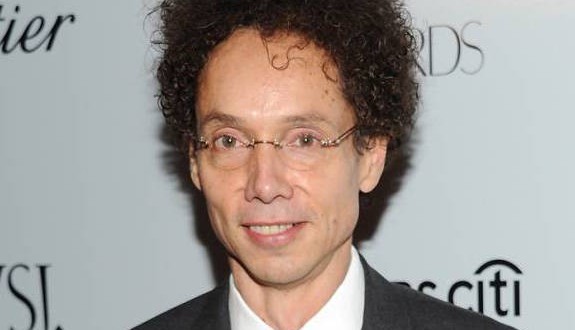Malcolm Gladwell Plagiarism? The anonymous plagiarism watchdogs who spent months going after Fareed Zakaria have finally set their sights on another target: Malcolm Gladwell, the best-selling author and New Yorker staff writer.
In their blog, Our Bad Media, the duo allege that Malcolm Gladwell — staff writer at the New Yorker and author of countless pop-sociology bestsellers that have propagated myths like the “10,000 hour rule” — lifted material on at least three separate occasions for stories he wrote for the magazine. The two also posted side-by-side comparisons of the passages, with the alleged parts that were plagiarized highlighted.
One allegation involves a story about how Apple founder Steve Jobs haggled with Xerox to let him visit their PARC facility. @blippoblapplo and @crushingbort claim that Malcolm Gladwell plagiarized Jeffrey S. Young, whose 1988 book “Steve Jobs” recounts this very same event.
“So, if you read Malcolm Gladwell’s article — and noted how ‘Tesler recalled’ the story of Jobs’ reaction to no one in particular — you’d naturally assume that Malcolm Gladwell had interviewed Tesler himself,” the two write. “He didn’t.”
They also question a series of passages used by Malcolm Gladwell that appear to borrow from Miles Wolff’s “Lunch at the Five and Ten,” a 1970 book about the Greensboro sit-ins. @blippoblappo and @crushingbort assert that details found in “Small Change,” the Malcolm Gladwell New Yorker article in question, provides specific details not found elsewhere except Wolff’s book.
New Yorker editor David Remnick responded to the allegations, telling Capital that citing secondary sources are a challenge for journalism because it doesn’t have the luxury of footnotes. His entire statement:
“The issue is an ongoing editorial challenge known to writers and editors everywhere — to what extent should a piece of journalism, which doesn’t have the apparatus of academic footnotes, credit secondary sources? It’s an issue that can get complicated when there are many sources with overlapping information. There are cases where the details of an episode have passed into history and are widespread in the literature. There are cases that involve a unique source. We try to make judgments about source attribution with fairness and in good faith. But we don’t always get it right. In retrospect, for example, we should have credited Miles Wolff’s 1970 book about Greensboro, because it’s central to our understanding of those events. We sometimes fall short, but our hope is always to give readers and sources the consideration they deserve.”
@blippoblappo and @crushingbor posted a follow-up piece on their blog defending their claims. @crushingbor also addressed Remnick’s response, all but accusing him of backtracking from his stance on plagiarism after Jonah Lehrer, a former New Yorker staffer, was found out to be plagiarizing.
with all due respect to David Remnick, it's hard to not notice the sudden switch in standards here pic.twitter.com/fHsWKqjkv3
— Pa-Rum-Pa-Bum-Bort (@crushingbort) December 11, 2014
For his part, Malcolm Gladwell responded to the accusations by pointing to a 2004 essay he wrote for the New Yorker on plagiarism.
Agencies/Canadajournal

 Canada Journal – News of the World Articles and videos to bring you the biggest Canadian news stories from across the country every day
Canada Journal – News of the World Articles and videos to bring you the biggest Canadian news stories from across the country every day




I am of two minds about this – if you steal ideas from a work of fiction you can honestly call that plagiarism. But if you are reporting actual occurrences factually you can hardly call that the same thing can you? If I go in and buy a cup of coffee how many different ways can you describe that in speech let alone writing?
I agree. The content in question seems to be exclusively related to events that occurred. In which case, they are all going to sound very similar. To the larger question of citation, it seems implicit that Mr. Gladwell is not attempting to state for example that he himself was sitting at a Woolworth’s lunch counter in 1960 and witnessed the event described – he clearly came to know about the event and was repeating what he learned from one or more sources. in this case, how does failure to cite original sources of events equate to plagiarism? I do not believe it does.